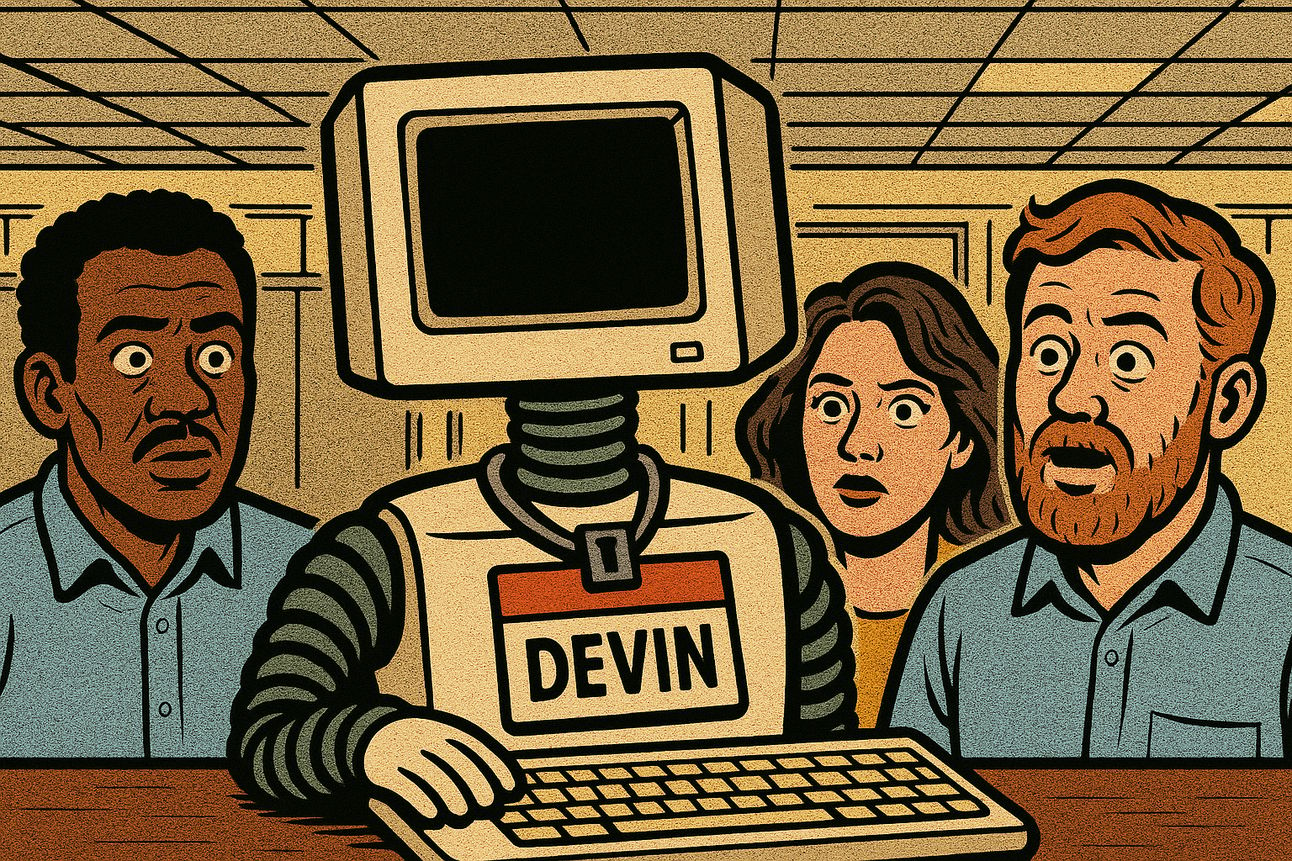- The Artificial Times
- Posts
- Who's The New Guy?
Who's The New Guy?

Happy Monday! Feeling allergic to fluorescent lights and forced small talk today? Been doom-scrolling your way through YouTube, watching 20-somethings vibe code their way to million dollar startups while you're still reheating sad desk lunches? Same. That’s why we built FutureSight Business Builder. Your shortcut to building something real without quitting your day job (yet). Let’s build something cool.
Markets pull back as new tariffs cause market uncertainty
Meet your new coworker, “Devin”
Trending AI tools
New business trend: M&A without the A
Fresh Business ideas
Read time: 5 minutes
AI Markets

Data is provided by Google Finance as of market close 7/13/2025.
Markets Summary: Tech-focused ETFs ticked slightly lower over the weekend, as the Nasdaq pulled back modestly off recent record highs due to mounting tariff threats and the inflationary pressure they will put on the economy. Despite the dip, mega-cap chipmakers held steady, buoyed by Nvidia’s historic over $4 trillion market cap milestone and continued strength in AI chip demand.
Business News

Goldman Sachs just hired a new "employee" for its dev team, and… surprise! it doesn't drink coffee, take PTO, or cook leftover fish in the breakroom. Meet Devin, the AI coding agent that might just out-code your best engineer.
Why It Matters
Wall Street isn’t exactly known for early tech adoption, but Goldman is flipping the script. The bank, which already has around 12,000 developers, is quietly deploying hundreds of Devins to tackle real work like fixing bugs, writing full-stack apps, and handling ancient legacy code. This isn't just a flashy toy. It's an AI tool that executes multi-step dev tasks on command.
The Breakdown
Say hello to the hybrid workforce. Goldman isn’t laying off developers. Instead, they're offloading the grunt work to AI so humans can focus on higher-level strategy.
Legacy code better watch its back. Devin thrives in messy, complex systems that human devs dread. It can modernize old infrastructure with shocking speed.
Is this augmentation or automation? Goldman says it’s augmentation for now. But with some experts predicting up to 200,000 banking jobs could vanish in the next few years, the line might blur fast.
Why This Matters to You
If a buttoned-up financial giant like Goldman is bringing AI into the engineering bullpen, your industry probably isn’t far behind. This signals a shift in how tech teams are built. Coders may soon be writing prompts as often as they write functions.
Final Thought
Goldman is betting that AI can turbocharge productivity. The real question? How many Devins will it take before we start asking if humans are the sidekick. One thing’s for sure: the cost of building software is about to change. A lot.
Trending Tools
Fathom: AI Meeting Notetaker
Crashes your Zoom/Teams/Meet call, transcribes it lightning fast, and delivers concise summaries so you can look engaged, even in sweatpants.
Zapier AI: No‑Code Workflow Automator
Turns your natural language requests into multi-step automations: draft emails, summarize PDFs, fire off Slack alerts without typing a single line of code.
Google Gemini: Multimodal AI Assistant
The AI assistant that's basically Google Assistant on steroids: chat, analyze docs, generate 8‑second videos from images, even voice‑control your smartwatch.
At Work

OpenAI almost bought Windsurf for $3 billion. Then Google walked in, grabbed the CEO and top engineers, and walked out with the talent (and a licensing deal) for less. Welcome to the new era of “M&A without the A.”
The Breakdown
Windsurf, a buzzy startup building AI coding agents, was on track to be acquired by OpenAI. The deal looked solid (letter of intent signed, all systems go) until it wasn’t. According to TechCrunch, negotiations fizzled thanks to internal resistance at OpenAI, specifically around intellectual property overlaps with Microsoft. While OpenAI hesitated, Google pounced.
In a twist worthy of an HBO miniseries, Google’s DeepMind scooped up Windsurf’s CEO Varun Mohan, co-founder Douglas Chen, and a chunk of their research team. They also paid $2.4 billion for a non-exclusive license to Windsurf’s core tech. No messy acquisition. No antitrust drama.
Windsurf’s 250-person team will continue as an independent company under interim CEO Jeff Wang, but losing your founding leadership and top brains mid-flight isn’t exactly confidence-inspiring. Meanwhile, Google folds Windsurf’s tech (and talent) into Gemini, their rival to OpenAI’s GPT-powered tools. Their focus: “agentic coding,” or AI that can write, debug, and deploy code like a Red Bull-fueled engineer.
OpenAI, by contrast, walks away with nothing but an expired letter and some awkward investor questions.
Why It Matters
This isn’t just AI industry drama. It’s a strategy shift. The real war isn’t just over who builds the best model. It’s about who can attract and retain the brains behind it. With regulators watching big mergers closely, moves like this (talent grab + licensing) might become the new normal. Google didn’t buy Windsurf. But it may have just acquired its soul.
Want to Launch Your Own Business?

Ready to build it?
Visit our Daily Business Idea site for a step-by-step breakdown that makes launching simple. The best part: you’ll get all the tools, prompts, and guidance you need to go live.
What else is in your future
In this economy?: U.S. consumer inflation expectations eased in June
I like you, do you like me?
Let us know how we did! What would you like to see more/less of in our next issue? Just hit ‘Reply’ to this email and give us your honest feedback.